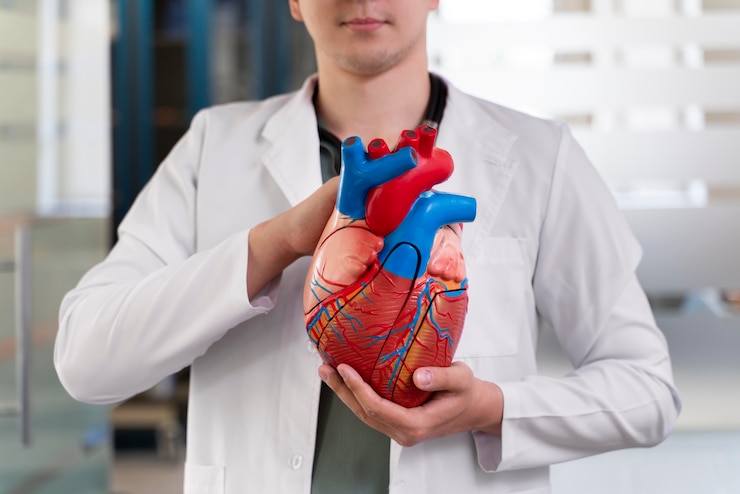Millions of people worldwide suffer from hypertensive cardiovascular disease (HHD), one of the leading causes of death and illness. This condition, which results from the long-term effects of high blood pressure, takes years to develop. The true threat of HHD is its gradual progression; frequently, those who are afflicted are unaware of the full extent of the harm until it is too late. This disease is primarily caused by hypertension, which is defined as blood pressure that is continuously higher than 120/80 mmHg. The good news is that early detection and management can greatly lower the risks, which can range from heart failure to strokes.

One area of the cardiovascular system is not the only one affected by hypertensive heart disease. The strain that uncontrolled blood pressure places on the heart causes a number of heart conditions, such as coronary artery disease and left ventricular hypertrophy. The heart has to work harder to pump blood throughout the body as blood pressure rises over time, which causes the heart muscle to thicken and the blood vessels to sustain damage. This raises the risk of major cardiovascular events like heart attacks and strokes and eventually can lead to heart failure.
| Hypertensive Cardiovascular Disease Bio Data | Details |
|---|---|
| Condition Name: Hypertensive Cardiovascular Disease (HHD) | Risk Factors: Chronic high blood pressure, family history, smoking, obesity, excessive alcohol consumption |
| Primary Cause: Uncontrolled high blood pressure (Hypertension) | Affected Organs: Heart, Blood vessels |
| Symptoms: Fatigue, shortness of breath, chest pain, swelling in legs | Prevalence: 1 in 3 adults in America have high blood pressure |
| Major Complications: Heart failure, stroke, arrhythmias, ischemic heart disease | Treatment: Antihypertensive medications, lifestyle changes, goal-directed medical therapy |
| Management Guidelines: JNC 8, AHA/ACC Recommendations | Prognosis: Can be managed effectively with early intervention |
Uncontrolled Hypertension’s Cost: Heart Failure and Stroke Risk
Heart failure is among the most worrisome consequences of long-term hypertension. Uncontrolled high blood pressure makes it difficult for the heart to pump blood, which thickens the heart’s walls and lowers pumping efficiency. Heart failure may eventually result from this disorder, which is called left ventricular hypertrophy. Other cardiovascular conditions like coronary artery disease, which can limit blood flow to the heart and worsen the symptoms of HHD, make the problem worse. People with hypertensive heart disease have a significantly increased risk of experiencing a heart attack or stroke, especially if their blood pressure stays elevated for a long time.
Surprisingly, hypertensive cardiovascular disease affects people of all ages. People of all ages are susceptible to this condition, but the risk rises with age, particularly after the age of 65. Women are more susceptible to heart-related complications, especially as they approach postmenopausal age, while men are more likely to develop heart failure as a result of hypertension. This fact emphasizes how crucial it is to keep an eye on blood pressure in both genders and all age groups in order to guarantee prompt management and treatment.
Understanding the Warning Symptoms: Prevention Is Essential
Early identification and treatment of high blood pressure are essential for preventing hypertensive cardiovascular disease. Frequent examinations can help detect hypertension before it causes serious complications, especially for those who are at risk. According to the American Heart Association, only half of people with high blood pressure successfully manage their condition, despite the fact that it is mainly preventable. This figure emphasizes the need for increased public education and awareness regarding the risks of untreated hypertension and the precautions people can take to safeguard their heart health.
Modifications in lifestyle are crucial for lowering blood pressure and averting hypertensive heart disease. Important strategies for controlling hypertension include eating a balanced diet, getting regular exercise, abstaining from smoking, and limiting alcohol intake. Additionally, drugs like diuretics, calcium channel blockers, and ACE inhibitors can be used to control blood pressure and delay the development of hypertensive heart disease.
Medical Guidelines’ Function in the Treatment of Hypertensive Cardiovascular Disease
Medical guidelines, such as those published by the American Heart Association (AHA) and the American College of Cardiology (ACC), offer crucial treatment frameworks for the management of hypertensive cardiovascular disease. For instance, blood pressure is divided into four groups according to the JNC 8 (Eighth Joint National Committee) guidelines: normal, elevated, stage 1, and stage 2 hypertension. These recommendations assist medical professionals in choosing the best course of action for each patient based on their unique blood pressure readings.
Although lifestyle changes are usually the first line of treatment, medication may be recommended if blood pressure doesn’t go down. The most widely prescribed drugs to reduce blood pressure and stop the progression of heart disease include beta-blockers, calcium channel blockers, ACE inhibitors, and thiazide diuretics. In order to effectively control their blood pressure, patients with stage 2 hypertension are frequently prescribed a combination of two or more medications.
